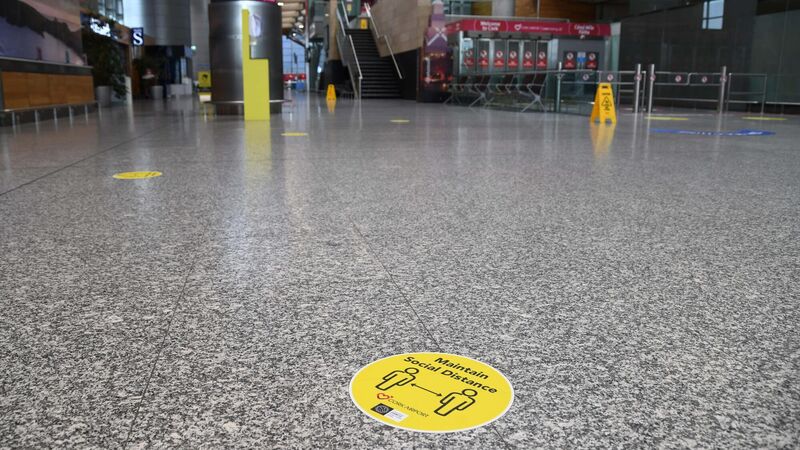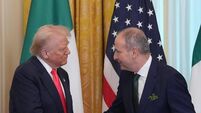John Dolan: Covid inquiry must expose the flaws in ultra-cautious policy

Social distancing signs at a deserted Cork Airport during the covid-19 restrictions in 2021. Picture Denis Minihane.
Intriguingly, it was in regards to Ireland’s approach to the covid pandemic all of five years ago where Catherine Connolly and Heather Humphreys found their views aligned.
Asked in the final debate on RTÉ’s what was their biggest regret, both harked back to that strange era of lockdowns, social distancing, surges, and super-spreaders (shudder).
For her part, Humphreys was a Fine Gael minister in the Coalition government in 2020, and spoke of her sadness that the relatives of dying people could not be allowed to be with them in their final moments.
Independent Galway TD Catherine Connolly’s regret related to the fact that she initially supported the Government’s covid restrictions.
“I went [along] because the fear was so extraordinary that I went with that,” she recalled.
Considering both politicians are from opposite ends of the spectrum, and found little common ground throughout the campaign, their stances regarding how Ireland tackled the pandemic are revealing.
For a long time, Ireland has patted itself on the back for its strict and swift response to the pandemic, and it’s true it undoubtedly saved many lives from the virus.
Even now, few would be quick to blame Leo Varadkar, Micheál Martin and health service officials for their actions - and at the time you might recall how our safety-first approach contrasted nobly with the flailings and mistakes made by the US and UK.
But, as the covid crisis progressed, there is a strong argument to be made that we stuck to that ultra-cautious line for too long, and that some of the restrictions surrounding people dying and funerals were too Draconian. Then there was the fiasco of how covid so easily entered our nursing homes.
But time allows people to ponder and reassess - and it’s vital that we undertake a cold analysis of not just what we did right in those dark days, but what we did wrong.
We owe it to the people who died of covid, or of other ailments at that time, and to the people who suffered in all kinds of ways, and we owe it to future generations - to ensure that if and when another pandemic arrives on these shores, we are well-equipped to deal with it, and won’t repeat any mistakes - excusable as they may have been in the early 2020s.
The good news is that a ‘public evaluation’ of Ireland’s covid response has begun.
There has been some criticism that the inquiry - officially titled COVID-19 Evaluation - will not deal with issues of civil and criminal liability, but instead make recommendations for future change that will be presented to Government.
But I personally think this is fair. A witch-hunt is not necessary - god knows it must be hard enough for the politicians and health officials of that era to have major, life-changing decisions they made on our behalf forever on their conscience.
The inquiry has also come under fire for being conducted, for the most part, behind closed doors, and for the fact it will not have the power to compel witnesses to attend. The transcripts of any interviews will not be made available, and no blame will be apportioned, while there will be no testimony accepted from whistle-blowers.
Some of these stances are harder to excuse.
Contrast our low-key inquiry with the one currently taking place in the UK.
It’s been interesting in recent months to see the likes of former Prime Minister Boris Johnson being fiercely grilled in public and before TV cameras as part of their covid inquiry, which began more than three years ago and will continue into 2026.
It’s true that the UK government made many highly damaging errors in their pandemic policy, but perhaps we could learn a little from their willingness to lift restrictions sooner, for instance, where it was safe and prudent to do so.
All the evidence from around the world should lead any inquiry to suggest there was a happy medium ground which worked best in dealing with the pandemic.
A lax approach saw covid rip through entire populations to devastating effect, while a stringent approach risked harming the very fabric of society and infringing on people’s rights. The latter could end up being just as deadly - if not more so - than the virus itself, in terms of lives ruined and lost.
If that is the mistake Ireland made, then it needs to be acknowledged and accepted in the inquiry now taking place.
The latter, in which individuals, families, workers, carers, communities and businesses shared their experiences of the pandemic, found that high levels of negative impacts were emerging across several areas, including education and development, civil liberties, human rights and trust and mental health. Isolation and loneliness were particularly highlighted.
It also found that those who reported difficulty in making ends meet reported “considerably wider” negative impacts to restrictions, while whole swathes of young people had their education and emotional growth adversely affected.
Professor Anne Scott, Chairperson of the COVID-19 Evaluation, said the public survey was “the first step in building a clear and honest picture of how covid-19 was lived and felt by individuals, families and communities throughout Ireland.
“Our goal is to produce a thorough, independent assessment of Ireland’s pandemic response. One that reflects real life as well as official records. We aim to understand what worked and what didn’t.”
Going off the comments of the two presidential candidates, there will be no shortage of testimony regarding what this country did wrong in those fraught pandemic days.







 App?
App?




